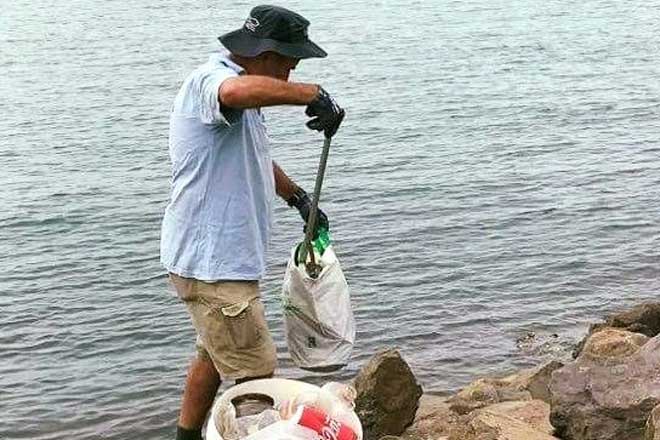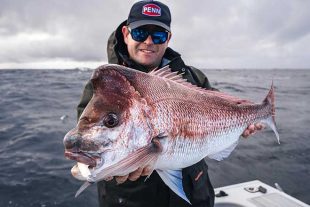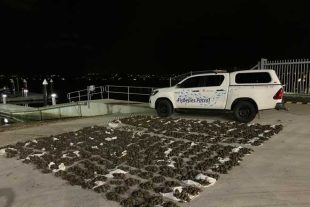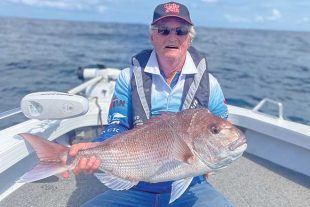Fishing-related litter has been identified as a key environmental threat in NSW and elsewhere around the world. As well as impacting on aquatic habitats – and being a really bad look for all recreational fishers, litter can harm aquatic life. Although the amount of fishing-related litter may not be as high as other types, it can have a bigger impact on wildlife that interact with it.
Birds, turtles, platypus, seals and other aquatic animals can be accidentally injured by discarded fishing tackle by becoming entangled or ingesting the fishing gear – such as lost fishing line, hooks, sinkers, lures, traps and nets.
Also, visitors and their dogs that visit popular fishing sites to walk their dogs can also be impacted by fishing litter, especially discarded hooks.
No one likes the sight of litter or fishing waste when spending a day by the water so remember to always responsibly dispose of rubbish, bait and unwanted tackle – even if it is not yours! Find out more about a great initiative that aims at minimising recreational litter through the installation of hook and line bins.
Handy tips to help reduce fishing-based litter and marine debris include:
- Go packaging free – Before you go fishing, properly dispose of packaging from any new gear. Using a tackle box is a great way to keep gear tidy, accessible and packaging-free, preventing litter from getting into our waterways.
- Stash your trash – Be mindful of where you keep your litter while fishing to prevent it from attracting wildlife or being blown or washed away.
- Fish smarter – Fishing in areas with snaggy structure? Think before you cast. Fish towards the features rather than over them, or carefully present your bait above any structure to improve your catch rate and reduce gear loss. Familiarise yourself with fishing techniques that minimise gear loss and marine litter.
- Mind your lines – Keep a close eye on your lines and gear while fishing. Attending your lines can prevent lost tackle and means you can avoid unwanted interactions with wildlife and other water users.
- Remove bait and secure hooks when you’re not fishing to avoid any interactions with kids, dogs, and wildlife.
- Look out for hook and line bins that are specifically designed for used and discarded recreational fishing gear.
- Leave no trace – Leave your fishing spot cleaner than you found it. After fishing, take a moment to scan and clean up any unused bait, fish waste, and any litter, even if it isn’t yours.
- Collect and properly dispose of unused bait, bait packaging, fish waste, and litter, even if it isn’t yours. Leave your fishing spot cleaner than you found it.
- If a public bin is overflowing, find another bin or take your rubbish home with you.
- Make it safe – When disposing of fishing line, cut it into small pieces and ensure that it is secure within the bin to reduce the risk of entangling scavenging birds and wildlife.
- Get involved – Go the extra mile and participate in any ‘Clean Up’ events that are taking place in your local area. By participating, you’ll not only be making a positive impact on the environment but also contributing to the social fabric of your community and recreational fishing.
Pollution
When cleaning your catch, be mindful where your fish waste ends up. You should place it in the bins provided or take it home with you.
It is particularly important not to dispose of fish waste into sheltered waters such as small bays and estuaries, as it can have a negative impact on water quality and the local environment. As the waste decomposes through bacterial action, it can cause dissolved oxygen to become depleted, reducing water quality and impacting the wildlife that inhabit the ecosystem.
Fish waste can also create unpleasant odours, especially during the warmer months. It can also attract fish scavengers such as stingrays, or other wildlife (such as pelicans and seals in certain locations) to the area which, although providing a food source for them, alters their normal behaviour and could potentially impact on their health and fitness. It can also result in creating an unsafe environment for the community.
Other Resources
NSW Department of Planning and the Environment
Tangaroa Blue – ‘What does marine debris mean for our oceans?’
Take 3 for the Sea
OzFish
 Bush ‘n Beach Fishing Magazine Location reports & tips for fishing, boating, camping, kayaking, 4WDing in Queensland and Northern NSW
Bush ‘n Beach Fishing Magazine Location reports & tips for fishing, boating, camping, kayaking, 4WDing in Queensland and Northern NSW









